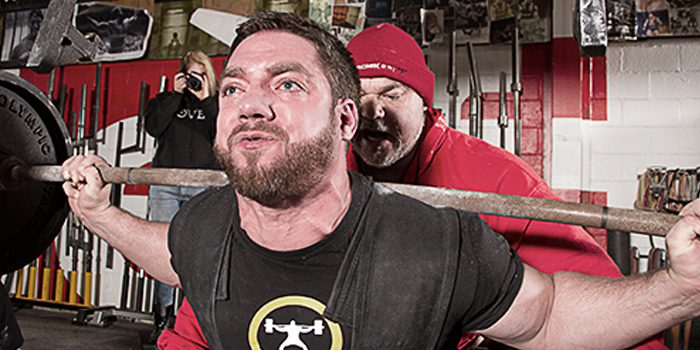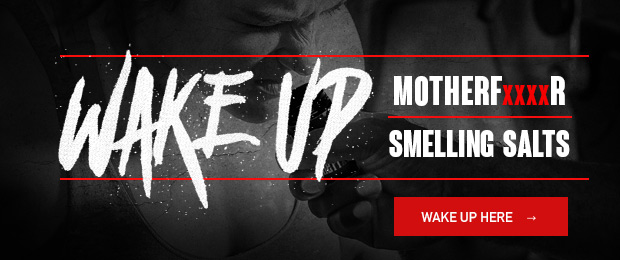
In competitive athletics, and in life in general, you’ve probably heard the term “failure is not an option.” Whether it's athletics, academics, or employment, many of us have conditioned ourselves to believe that if we choose to take on a challenge, we can only do so if we can completely eliminate the possibility of failure. While a positive mental approach that does not focus on failure can be a great thing, sometimes the absolute fear of not just failure itself, but the mere possibility of it, can keep many of us from stepping up to challenges ahead of us. Combine this mindset with a competitive attitude and high personal standards, and the idea of competing when you know you aren’t at your best can seem ridiculous.
This was the internal struggle I dealt with as I approached XPC Finals at the Arnold Classic this year. Over the past several years I’ve struggled with severe anxiety, insomnia, and depression (usually working in that order), and while I’ve been able to make some pretty substantial progress in training despite a lack of full recovery, the past six months (after doing several big meets in a row with very little down time) I think I pushed myself past my breaking point. I constantly felt burnt out, couldn’t sleep for days following a max effort lift, and struggled to function both at work and socially. I typically do a pretty good job not letting my mental issues affect my interactions at work, but even this area began to suffer. I had been working with different doctors and counselors to find ways to be productive in improving myself in regards to these areas, and along with some different medications that seemed like they could finally make a difference (I’ve tried dozens off-and-on over the past several years), I knew a break from heavy training for at least a few weeks was very needed. Especially after reading some of Chad Aichs articles about his experiences with his bipolar disorder and how intense training negatively affected his sleep and behavior, it helped me to change my initial thought process from “I’m just being a pussy,” to realizing these were some variables I really needed to begin considering in my training. For those who haven’t read them, I highly recommend Chad’s articles.
RELATED: Living and Training as a Bipolar Narcoleptic: Lack of Sleep and Depression
The above situation put me at a tough crossroads. At this point I was a few weeks out from XPC Finals and my training was suffering badly (I was missing lifts far below what were typically openers for me), but even my life outside of training was being negatively affected. It was getting hard to make it through a day of work without going to the bathroom feeling like I was going to puke from anxiety. I knew what lifestyle and training changes (starting with a four-week break from barbell work) would start allowing me to dig out of this hole of overtraining, but I still had a few weeks left of meet training (Circa Max at that), and a big elite-level competition ahead. A huge part of me wanted to drop out of the meet and give myself a break, and begin the “off-season” I knew I desperately needed. Especially knowing that my performance would likely not be my best (note that despite this, on meet day I always approach things as if it will), it was hard imagining the idea of taking the stage at the Arnold representing myself and elitefts, and potentially putting together an embarrassing performance.
Photo via Paris Productions
On the flip side of this was the idea of quitting, especially when physically I could still compete (I have hip issues that I need to address, but I didn’t believe training for a few more weeks would cause any permanent damage). I talked with Dave Tate one weekend about the situation, and he said that if I wasn’t at high risk for injury, that slugging things out and competing was my best option. He reminded me that I’m at the point in my career (competing a little over five years) where most people leave the sport because things get tough and the progress isn’t linear like it was as a beginner. After discussing some more things with him, I felt confident that if I could stick out this training cycle and step on the platform despite of everything going on, it would benefit me in the long run.
Now I will say this, I don’t think dropping out of the meet is always the wrong option either. And if you’re in a similar situation, I encourage you to make sure you’re putting your mental and physical health first. If I thought pushing training a few more weeks would’ve pushed me mentally to the point of not being able to function and put my job at risk, or even to the point of something like suicide, I would not have competed. Powerlifting is extremely important to me but it is not my only priority in life. Overall I struggled with my decision but still felt the upside outweighed the risks of continuing to train a few more weeks and compete.
RECENT: 2016 Arnold Sports Festival — Expo, XPC Meet Reports, and S4 Compound Events
The biggest potential damage I anticipated was to my ego in light of a poor performance, and this was a situation I knew I needed to look in the mirror, tell myself not to be a pussy, and take on the challenge, no matter how big of a dose of humility it might entail. After the final weeks of training and deloading before the meet, I went in to XPC Finals exhausted but trying to focus on the experience and the lesson in perseverance this would be. You can read the meet report for XPC Finals here , but overall the meet went well, and despite not having my best total, I still got a bench PR and got through a tough meet. While it wasn’t close to my best performance, it was probably one of the performances I will value the most in powerlifting, and a five-pound PR on bench has never meant more to me than on that day. I certainly am not content with how I did, and I look forward to moving far beyond that total as I compete in the future. But the lessons I learned of persevering through this training cycle and competition are things I could never take from a training cycle in the future where things are all going as planned.
I share my experience with you to hopefully encourage you if you’re struggling with similar decisions. Your challenge may be something small, or something far bigger than what I dealt with. No matter what, know that there is value in choosing to embrace a challenge even when failure seems like a big possibility. I would go a step further and say there is the most value in choosing to compete when failure is a big possibility. Every part of me wanted to give in to the fear of failure and drop out of the competition, but I’m glad that I chose to compete in spite of my performance. The experience I had will give me a renewed sense of focus and perseverance in future training cycles, and ten years from now I will be a better powerlifter having continued to compete when things weren’t ideal.
Whatever your challenges are, don’t fear failure. It is an option, but you have the choice to compete despite of that. The character you build in the valleys of life will make you appreciate the peaks that much more.












5 Comments